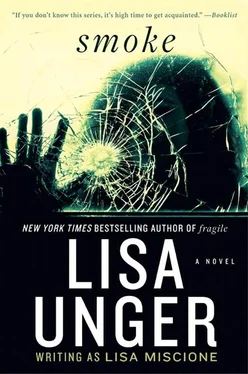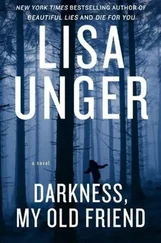“I’m not blaming myself,” she said defensively. “I’m just following my own advice. I’m getting inside her head.”
“Uh-huh,” he said, letting the subject drop. “Well, Dax thinks he found a way inside The New Day.”
“He thinks?” She had a brief but vivid imagining of them all being captured by The New Day, strapped into five-point restraints on gurneys, forced to watch some kind of religious videos with their eyes pried open in a hideous Clockwork Orange scenario.
“Well, it’s not an exact science, breaking and entering,” said Jeffrey. “There are a lot of variables, as you well know.”
“Great,” she said.
“I’m with Dax now in Riverdale,” he said. “We’re going over the details. When can you get here?”
“I have to make a stop first and then I’ll be there.”
“Where are you stopping?” he said, sounding suspicious. She had a bad reputation for doing reckless things on her own and paid for it by having to answer a lot of annoying questions from her husband.
“I have to pick something up from my grandmother.”
“What?”
“I’m not sure.”
She was so glad her grandparents had moved into the city. The house they’d had in Nyack and then later the one they’d had in Sleepy Hollow had each been uncomfortable for her in different ways. The house in Nyack was so like the house in which she had lived with her mother, the house in which her mother had been murdered. Same clapboard, white trim, same shingled roof.
When her grandparents moved to Nyack to take care of Lydia after the death of her mother, they thought it was important that she stay in the same neighborhood, attend the same school so that her life as she knew it wasn’t totally obliterated. Looking back, Lydia wondered if it had been the best idea. It might have been harder initially but in the long run, moving to another area, starting at a new school might have helped her to reinvent herself. Instead, in school she would forever be “the girl whose mother was murdered.” Living less than a mile from the house where her mother had been killed, she always had to consciously avoid that street and notice neighbors and the parents of her classmates avoiding that street during car pools. There were always small reminders that seemed to keep the wound forever fresh.
The house in Sleepy Hollow had been different, quaint and Victorian. But Jed McIntyre had been there, too. The move to the city had been good for everyone.
She walked into the lobby of the luxury high-rise and nodded to the doorman, who recognized her and let her through without buzzing up to her grandparents. The heels of her boots clicked loudly on the marble floors and echoed off the high ceiling. She looked at her reflection in the polished metal doors of the elevator and thought she might try wearing some other color than black one day, but doubted it.
She rode the elevator to the fifteenth floor. Her grandmother was waiting for her at the door in a navy velvet dressing gown and slippers Lydia had given her for Christmas the previous year. The doorman must have called up to say she was on her way.
“This is a surprise, Lydia,” said her grandmother, embracing her. She smelled of ivory soap and talcum powder, her hands felt soft and papery. She stepped aside so Lydia could enter, and Lydia walked through the entranceway and into the living room.
“Grandpa’s sleeping.”
“It’s only eight o’clock,” she said, looking at the clock on the VCR. “If it were summer, it would still be light out.”
“Well, if he didn’t get up at four in the morning he might not go to bed so early. But try to tell your grandfather anything and see where you get with it.”
The television was on with the sound down. Lydia could smell garlic from something her grandmother had cooked earlier.
“What are you watching?” she asked, sitting on the chintz sofa her grandparents had had since she was a child.
“One of those crime scene investigation shows,” she said, waving a hand at the screen. “I don’t know which one; they’re all the same to me.”
The low oak coffee table before her, the Tiffany standing lamp, the china cabinet were all items Lydia remembered from her childhood. Most everything else in the apartment was new, the building completed just months before they took residence. The apartment was modern, with every amenity: a brand-new, state-of-the-art gourmet kitchen, washer and dryer, parquet floors. Large windows provided sweeping views of the city. The old items looked out of place, antiquated, in the space, but Lydia couldn’t imagine her grandparents without them.
When Lydia and Jeffrey had bought their apartment in the Village, both of them had sold off most of their old belongings, keeping only their clothes, some meaningful pieces of art and jewelry. But they had chosen most of the items in their apartment together. New beginnings demanded new objects. Her grandparents didn’t share that philosophy. Don’t replace anything that isn’t broken beyond repair and change as little as possible. That was more of their approach to things.
Lydia watched as her grandmother lowered herself gingerly into her chair. She was going to ask if the arthritis was getting worse, but she knew her grandmother wouldn’t tell her anyway. Stoicism was highly prized in the Strong family; complaining was considered a weakness. Despite the rigidity of her movements, Eleanor Strong’s fabulous bone structure, her innate sense of style, and a great hairdresser kept her looking far younger that her nearly seventy-five years.
“Grandma-” Lydia began.
“I knew I shouldn’t have said anything,” she said. “I should have just waited until you came. Ever since you were a little girl, you’ve always been so impatient.”
Lydia couldn’t argue. Her grandmother seemed about to get up again but Lydia stopped her. “Just tell me where it is, Grandma. I’ll get it.”
She pointed over to a roll-top desk at the other end of the large living room and Lydia walked toward it.
“In the bottom drawer,” she said. “I suppose you’re going to be angry.”
Lydia opened the drawer and withdrew a stack of unopened letters, maybe ten or fifteen of them, grouped together with a rubber band. They were addressed to her at her grandparents’ house in Nyack. The name on the return address of the letter at the top of the stack read, “Arthur James Tavernier.” She flipped through and read the postmarks: 1985, 1987, 1988-all sent around the date of her May 7th birthday. She turned to look at her grandmother, who was looking at her slippers.
“Why, Grandma?” she said, quietly. “Why did you keep these from me? Why are you giving them to me now?”
She sighed. “At the time, it seemed like the right thing. You were so fragile, your grandfather hated him so much. Over the years, when you were older, stronger, it just seemed like a secret I had kept so long that it had turned into a lie, a deception. At a point, the letters stopped. You never asked about him. I told myself that I’d give them to you if you ever showed a curiosity about him. But you didn’t. So.” She ended with a shrug.
The women in the Strong family had always been unapologetic for the decisions they made. Marion Strong had been a strict, severe mother, not unloving but exacting. And Eleanor was the same. Lydia had never known either of them to regret a decision. But she saw something that might have been self-doubt glittering in her grandmother’s eyes.
“But why now?” said Lydia, walking back to the couch and sitting down.
“I figured now or never,” she said pragmatically. “I couldn’t very well just leave them for when I died. That would be pretty chicken of me.”
She remembered another stack of letters she used to have. Letters Jed McIntyre had sent her. She’d kept them in a drawer unopened to remind herself that he was just a man, incarcerated and only able to reach her through the US Postal Service. Not a demon who could reach down from the sky and destroy the people and things she loved; though that turned out to be closer to the truth.
Читать дальше












